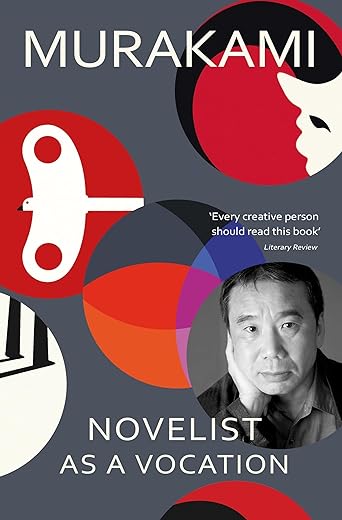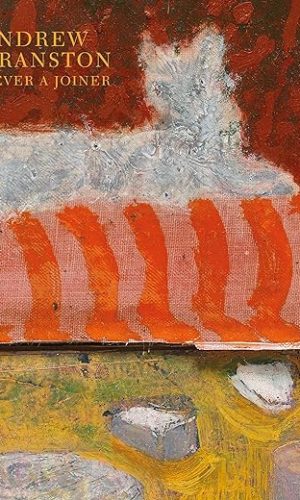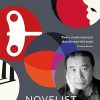Novelist as a Vocation: ‘Every creative person should read this short book’ Literary Review
£9.65£10.99 (-12%)
A unique look at the craft of writing from a bestelling master of storytelling.
In this engaging book, the internationally best-selling author shares with readers what he thinks about being a novelist; his thoughts on the role of the novel in our society; his own origins as a writer; and his musings on the sparks of creativity that inspire other writers, artists, and musicians.
Readers who have long wondered where the mysterious novelist gets his ideas and what inspires his strangely surreal worlds will be fascinated by this highly personal look at the craft of writing.
‘An insightful collection of essays on his work and methods… You end this collection of beautiful essays vowing to never let life, or writing, get so complicated again’ Guardian
‘Murakami is like a magician who explains what he’s doing as he performs the trick and still makes you believe he has supernatural powers’ New York Times Book Review
‘A fascinating glimpse of the peculiar writerly life’ Sunday Times
** A TIMES, SUNDAY TIMES and NEW STATESMAN BOOK OF THE YEAR**
Read more
Additional information
| Publisher | Vintage, 1st edition (11 Jan. 2024) |
|---|---|
| Language | English |
| Paperback | 224 pages |
| ISBN-10 | 1529918359 |
| ISBN-13 | 978-1529918359 |
| Dimensions | 12.9 x 1.4 x 19.8 cm |










by Sarah Wood
This is a lovely book to dip in and out of, Murakami comes across as such a nice guy, very humble, lots of lived experience and indirect advice not only about writing but also about how to live your life.
by Neve8
I have been a big fan of Haruki Murakami’s novels but I felt I wasted my hard earned cash with this non-fiction semi autobiographical book on writing novels. There are bits of it as he comes out as an moaner on certain Book Prizes.
I think he should stick to what he is good at but his recent works have not been as good as lately.
by Kuma
If you are a budding writer don’t expect to learn much from this as to how to go about the trade, but it is a fun read all the same as to how Murakami became successful. The most interesting thing I thought was how Murakami is honest about how upset he is about how his writing has been viewed by the so-called experts in Japan, and how he didn’t get the big Japanese literary prize. He talks about this so much that this is the closest you might see Murakami to losing his cool.
by Labra Doodle
The most interesting book of any type I have read this year. The sections on accessing the subconscious for ideas and characters were particularly good ????
by Anne
I haven’t read any of Haruki Murakami’s books in the traditional sense but I have enjoyed several as audiobooks, prompted by the publicity around the publication of Killing Commendatore a few years ago (I highly recommend Rupert Degas as a narrator). I find his stories and themes intriguing, a window onto a slice of Japanese life, albeit a very specific one: they’re populated by solitary men and mysterious women, cats, and deep wells. So I was interested to read what he thinks of his work.
What I found so refreshing about Novelist as a Vocation is its lack of pretension, which I found surprising from a long-successful and renowned writer. Murakami says a number of times that something is just his opinion or works for him and him alone; this apparent lack of ego in some respects is at odds with what I might expect from other male writers of the same generation. He is self-deprecating but it doesn’t come across as false modesty, just a matter-of-fact attitude.
Written over several years and published in Japanese in 2015, these essays have only now been translated. As a translator himself, Murakami is sensitive to and appreciative of the efforts of his translators, having worked with one or two in particular over the years. I found it fascinating that he found a way to writing more freely in Japanese by writing in his (as he has it) more limited English: with fewer options to express himself, he found a rhythm. But one which requires proper graft as well as creative input – he typically writes and rewrites several times.
I don’t read much of this kind of writing, but I really enjoyed this and it has made me think I might seek out more in the same vein. And I think it’s time to poke my toe back into the slightly off-kilter world of Murakami’s fiction. I like a long novel so perhaps IQ84?!
by lovemurakami
If you are expecting a ‘how to write fiction’ from this collection of essays from Haruki Murakami then you maybe disappointed. The essays do talk about how Murakami writes…….in a sense, however they are more an insight into the mind of Murakami. The essays are his personal journey into writing, in some sense how he approaches writing but they are not a typical how to write a novel book, eg how to create plot, how to pace a novel, how to start and end, this isn’t that sort of book. It’s much more about the man, an insight into his thinking, similar in many ways to What I talk about when I talk about running. You read the essays to get into Murakami’s mind, you read them for the joy of reading Murakami and you read them because you love Murakami.
by markr
I am a huge fan of Haruki Murakami’s novels, and am currently eagerly awaiting whoever he does next. I was therefore excited to read this book, which I hoped would tell a little of what inspired his work, where the familiar Murakami literary motifs (cats, earlobes etc) come from, and how he develops his motivation.
Instead I found a book made up of a collection of essays – some explain how Murakami go his start in writing, some the painstaking process of writing, rewriting and rewriting again, and some seem to explore Japanese culture, particularly literary and publishing culture. I found it all a little repetitive – goodness know how often the phrase ‘it goes without saying’ was used and not at all the fascinating insight that I had expected. Murakami could never be truly boring however and despite the above I did enjoy the book well enough to finish it, and I still can’t wait for Murakami’s next novel
by Amazon Customer
Purchased as a present for a friend – it was what she asked for and she seems very pleased with the book